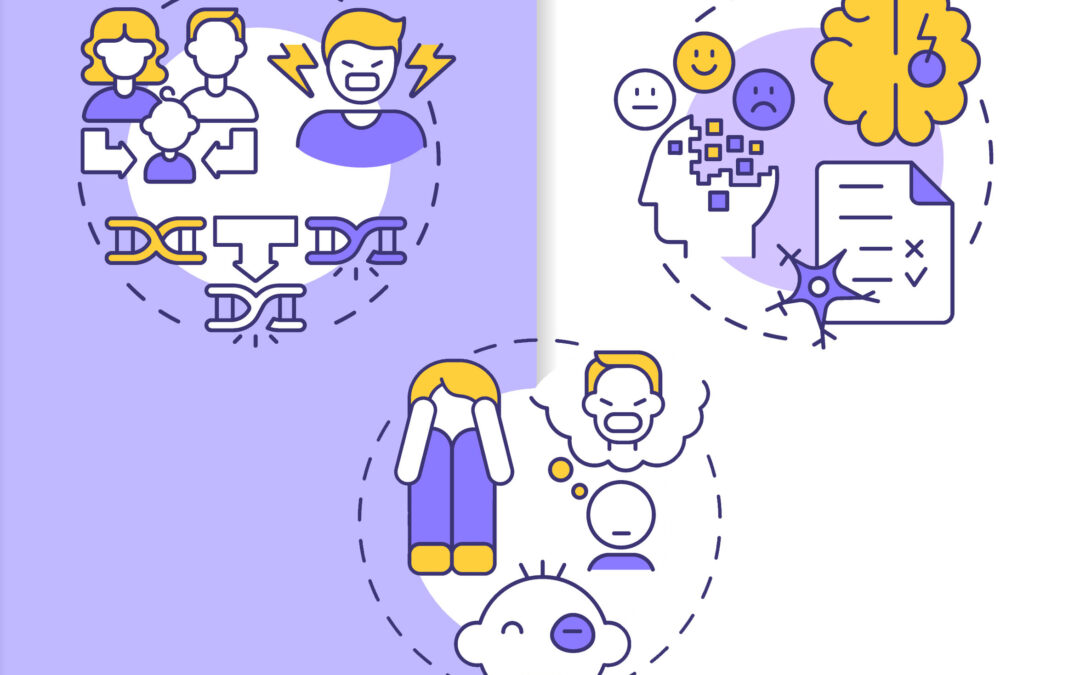Addiction is a complex issue and each person has their own personal path to recovery. There are several factors that can contribute to the start of addiction in the first place like genetics, environment, and mental health. Children in homes where addiction is present, often suffer the most and go on to struggle with addiction themselves. It is a vicious cycle that is hard to break for many families dealing with addiction problems.
How do genetics contribute to addiction?
Research points to genetics playing a role in addiction, as it often runs in families. It is believed that the brain’s response to drugs or alcohol may be affected by genes, putting those with certain genes at a disadvantage when it comes to addiction development. The neurotransmitter, dopamine, which is associated with reward and pleasure, is one example of this. Dopamine is often increased by substance abuse therefore fueling an ongoing cycle to increase use of substances.
How does the environment contribute to addiction?
Families often have a history of addiction which influences the overall toxic dynamic of a family, spinning more members into substance abuse. Many families that revolve around addiction expose even the youngest members of their families to alcohol and drugs. This can have serious consequences to a young person’s social development, physical, and emotional state. Many children that grow up in homes where substance abuse is present become more likely to use drugs and alcohol at a young age. Children may also have an increased exposure to being abused themselves while living with family members that have addiction issues, including experiencing physical, sexual, and emotional abuse. The trauma children experience while living in a home that is stricken with addiction can only add to their need to find coping mechanisms, any escape from the chaos they are experiencing. Often, the children in these homes also have access to substances and thus experiment at times. Parents that are struggling with addiction themselves may not even notice or disapprove of substance abuse by a child. Children in these predicaments do not have healthy role models or a supportive environment that encourages them to make healthy choices and many times are left unsupervised.
How does your overall mental health contribute to addiction?
Mental health issues often go hand in hand with addiction. This is why a well rounded approach to recovery is often needed that includes individual therapy or other treatments. Whether it be addiction that comes first or a mental health issue, each can contribute to the development of the other. One example of this can be found in patients that suffer from mood disorders like ADHD, anxiety or depression. Many look for ways to manage or relieve their symptoms and may self-medicate in an attempt to do so. This approach to finding relief can often backfire and make symptoms worsen. People with this issue will often build tolerance to substances that once helped them alleviate their symptoms and require more substances or an excessive amount as time goes on. This leads to cravings and mood shifts or even withdrawals. Drug dependency can also cause mental health problems. As the brain’s chemistry is changed with ongoing drug use, it is likely to see a rise in the development of depression, anxiety or other mental health related disorders.
What about the impact of co-occurring disorders?
When struggling with addiction and mental health, it is important to look at co-occurring disorders. This means that treatment is targeted to address both conditions a patient may be having. By addressing the co-occurring disorders, the chance of relapse can decrease and patients can experience long-term sobriety. This is often easier said than done as co-occurring disorders are difficult to diagnose as one disorder may exacerbate or mask the other. A well rounded team of support can help aid in identifying the orders and creating a roadmap of how to appropriately address them.
Our team at Scottsdale Recovery and Detox Center® understands this and has created a vast array of support services for those struggling with co-occurring disorders. We are committed to serving our community as well as those nationwide and provide a safe space for recovery. Our team is a phone call away if you or a loved one are seeking support! Learn more by visiting scottsdalerecovery.com or call 1-888-NODRUGS.

